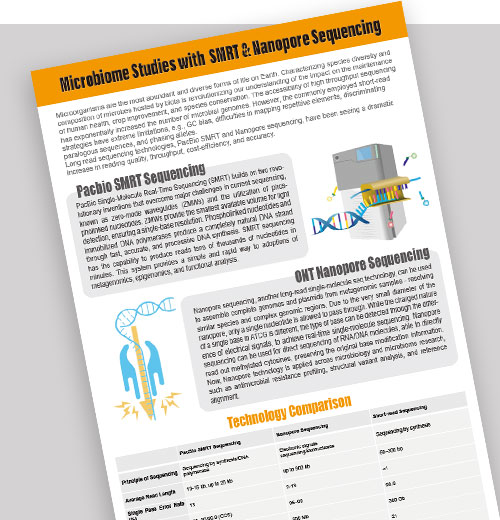We use cookies to understand how you use our site and to improve the overall user experience. This includes personalizing content and advertising. Read our Privacy Policy


We are dedicated to providing outstanding customer service and being reachable at all times.
Microbial Genomics with Long-Read Sequencing

Sequencing entire bacterial, fungal, or other microbial genomes is essential and important for generating accurate reference genomes, identifying microbial species, and conducting other comparative genomic studies. CD Genomics is a leading global life sciences company. We focus on innovative applications of long-read sequencing technologies, genomics analysis methods, and internet concepts in the pharmaceutical and biotechnology industries, science, and agricultural research.
Overview of Our Services
Traditional sequencing technologies pose a major challenge to microbial genomics due to read length limitations. With the development of long sequence sequencing technologies, precise and comprehensive genome annotation of a wide range of microorganisms is possible. Based on the advanced third-generation sequencing platforms, we are developing innovative, tailored, and cost-effective strategies and services to greatly accelerate the success of our customers' projects.
Microbial Whole-Genome Resequencing
- Bacterial Whole-Genome Resequencing
- Fungal Whole-Genome Resequencing
- Viral Whole-Genome Resequencing
Microbial whole-genome resequencing is the sequencing of the whole genome of bacteria, fungi, or other microbes, and comparing it to multiple known reference genomes. By generating complete and reliable microbial genome sequences, information on key mutations and low-frequency mutations among microbial strains and other genetic variations can be obtained.
Microbial Whole-Genome De Novo Sequencing
- Bacterial Whole-Genome De Novo Sequencing
- Fungal Whole-Genome De Novo Sequencing
- Viral Genome De Novo Sequencing
Using whole-genome de novo sequencing, the genomic information of microbes can be obtained, which provides a basis for studying the structure and function of microbial genes, identifying microbial species, exploring the evolutionary origin of microbial populations, and expanding the applications of microbes.
Long-read Metagenomics Sequencing
Metagenomics sequencing allows not only the accurate recovery of strain-level information but also the detection and identification of specific genes and helps identify virus communities missed by targeted sequencing methods. Based on long-read sequencing technologies, we combine the sample characteristics and data output to select the optimal assembly effect and fully explore the microbial communities and functional genes in environmental samples.
Full-Length 16S/18S/ITS Amplicon Sequencing
16S/18S/ITS amplicon sequencing, also known as microbial diversity sequencing. This method can obtain information on microbial community structure, evolutionary relationships, and microbial-environmental correlations from environmental samples by detecting sequence variation and abundance in the target region, without the need to culture microorganisms. PacBio SMRT long-read sequencing has overcome the limitations of short reads, allowing researchers to obtain full-length reads of 16s rDNA in bacteria or 18S rDNA and ITS regions in eukaryotes.
Full-Length Plasmid Sequencing
Although smaller than chromosomes, plasmids (5~500kb) are important genomic components carrying genetic information that can confer certain specific phenotypic traits such as fertility, drug resistance, pathogenicity, and metabolic alterations to the host bacteria and facilitate intra/interspecies gene flow. Long sequence sequencing can generate long sequence sequences, which have great advantages for genome assembly, especially plasmid assembly.
Antibiotic Resistance Gene (ARG) Analysis
Antibiotic resistance is one of the most serious global public health crises, and there is a need to understand the risk of arg mobility in the environment and its transmission pathways. Long reads generated by ONT Nanopore sequencing can reveal co-localized ARGs as well as their flanking genomic nucleotide sequences, providing additional information for better exploration of ARGs.

Benefits of our Service
- Decades of experience in genomics services.
- Optimized and well-established long-read sequencing platforms.
- Keeping up with the frontier of scientific research.
- Fast turnaround time and complete analytical study reports.
Bacteria and other microorganisms live in almost every environment on Earth, and the study of certain bacterial properties can have a significant impact on health, the environment, energy as well as industrial applications. Due to our advanced long-read sequencing platforms and our bioinformatic expertise, CD Genomics can offer fast, reliable, and cost-efficient services for microbial genome sequencing. Just let us know your research objectives and our team of experts will contact you within one business day to discuss your needs.
For research purposes only, not intended for personal diagnosis, clinical testing, or health assessment
